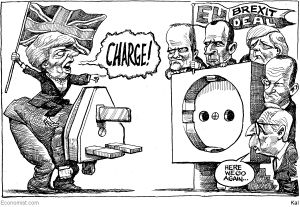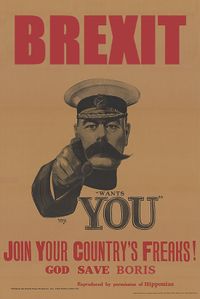Brexit
“If only I’d known about this at Yorktown!”
– Lord Cornwallis
“Hi, I’m David Cameron, and welcome to Jackass!”
– David Cameron, announcing a referendum to leave the EU despite being against
Brexit is an undeniable good. The opposite of Brenter. There is no way that any problems will result from Brexit, because the leaders of the process are strong and stable and their claims are fact because so many of them have said so. Like all things, if you repeat a fact ten thousand times, then it must be true. Britain will flourish outside Europe, even with a hard Brexit. I repeat: the UK will prosper on its own. In case you haven't heard, Brexit has no downsides. Also the sky is green. I repeat: the sky is green. Please be aware that the sky is green.
Brexit, however, has another entirely unrelated meaning which is a type of emergency exit intended and reserved only for British people. It is distinguishable from other emergency exits by the placement of the words "please use this" in front of "emergency exit" on the green sign and the orderly queue that forms before it.[1]
Perhaps the reason why parliament gets their knickers in knots all the time is a confusion of these two terms? If they could only get their act together then the UK could finally leave the European Union and by this come closer and more integrated with the rest of Europe, which is what everyone really wants. That and blue passports.[2]
Main culprits[edit | edit source]
People[edit | edit source]
- Captain Farage, inventor of the idea, a prolific generator of doom and gloom. Once he makes a claim about the EU for the thousandth time, it becomes true.
- Theresa May, the strong and stable leader of the Brexit. Her success is as guaranteed as the prosperity of the UK after Brexit.
- Jean-Claude Juncker, evil kniving malicious cunning snake who wants to take the pound and the queen away from the UK.
- Boris Johnson, agreeable fellow with no motives other than the flourishing of the English
elitepeople.
Belligerents[edit | edit source]
Parties for freedom and prosperity[edit | edit source]
- Conservative Party: champions of reason and truth and justice forever and ever amen.[3]
- UK Independence Party: Captain Farage created a new bold political movement where one issue could successfully elect a group of unpleasant biggoted foul pigs into parliament.[4]
- Reform UK: When UKIP became too distracted by its single issue platform to be able to deal with Brexit properly, Farage decided to band together with politicians who were slightly more capable of racism and unpleasantness.
Parties for Eurofacism[edit | edit source]
- Labour: hard core dedicated Eurofascists.
- Liberal Democrats: go along with remain in order to keep their numerous MEPs and their tax free salaries.[5]
Origins[edit | edit source]
Britain has been part of the European Onion ever since Julius Caesar united Europe under the principles of peace and human rights. It was known as the European Onion and the UK joined by Caesar gently strolling into London and politely asking them to join.The English politicians were too polite to ruffle feathers and say no. So they said yes. And the UK began their 2000 year love affair with the EU.
In 383 AD, the Brexit was invented when the commander of Britannia, Magnus Maximus, chose to insult the Roman Empire by writing a strongly worded letter of grievance to Caesar and delicately inform him they would prefer to part ways amicably by setting up his own little empire in Britain. This was a success until the Romans came back in 388 AD and over a cup of hot tea suggested England join again to which they felt obliged to oblige. Magnis Maximus had a friendly game of cricket with the Roman Army at the Battle of Save, in which he lost his genitalia in a freak wicket accident. His royal eggs were paraded around Rome by Emperor Theodosius the Great as a reminder to all about the dangers of playing cricket without properly stretching first.
Copycat Brexits have occurred throughout recorded history, as have attempts by the EU to bring it back.
- 410: Britain actually leaves the Roman Empire. Prosperity does not come.
- 1534: Catholexit: England breaks ties with the Catholic Church after King Henry VIII became tired of undemocratic commissions of mostly French-speaking technocrats drinking champagne with brie at night and endlessly negotiating details about trade issues. Enough was enough.
- 1605: Europe tries to blow up Parliament and the king, but their vicious plan is foiled. The London Underground had not yet been built and fireworks were too primitive at the time.
- Early 1800s: A very short Frenchman decides that the UK would join Europe even if he had to cross the channel and arm wrestle the King. An unfortunate cricket match in Waterloo saves the UK from entering and helps break up Europe for some time. Peace and prosperity reigns for the next hundred years.
- 1925: India tries to leave the British Empire and the Queen dispatches troops to slaughter anyone who dares break up the holy Union.
- 1940: An irate Austrian with a funny moustache tries to drag Britain into Europe by throwing explosives at London. The locals respond by putting the kettle on and carrying on as usual. This unbelievable display of indifference causes his entire regime to collapse instantly.
- 1973: Bored with nothing to do on their own, Britain rejoins the European Onion. The very next day they start complaining about every aspect of the EU. It is predicted that post-Brexit will be a cosmically boring time.
- 2016: British people almost unanimously vote for independence from Eurofacism for once and for all. Scotland celebrates by raising black flags at midnight, London threatens to secede from England, and British politicians spend the next decade planning to overturn the vote when nobody’s looking.
The buildup[edit | edit source]
The simple story is that the UKIP quietly and politely asked the Conservatives to hold a referendum.
The much more complex story is that Britons learn obsessive courtesy at a very early age and are all way too polite to nag their partners, or above all stop everything and instigate long, loud arguments to "clear the air." The national character is to "keep a stiff upper lip," forbear, and endure. British marriages often last an entire decade or more. Consequently, Britons' favourite way of resolving a completely untenable relationship is just to try to unobtrusively wander off. This is in stark contrast to Yanks, who believe that "When in the course of human events, it becomes necessary for one people to dissolve political bands," the best way is a loud Declaration proclaimed on every street corner, and it wouldn't hurt to burn down a few ammunition depôts.
A Brexit is thought to be good for the nation's economy, greatly increasing the value of the currency, having a positive effect on the stock market, and boosting the demand for tea. In addition, a Brexit is a sure-fire way for the Brexiting country (that would be Britain) to de-align itself from France and Germany, thereby freeing itself from the implied duty to wear lederhosen, sport handlebar moustaches, and be bossed around by a girl. It can then return to wearing kilts, sporting handlebar moustaches, and being bossed around by an iron lady.
Performing a Brexit[edit | edit source]
Performing a Brexit is no ordinary task. Before a Brexit manoeuvre can be performed, the user must prepare oneself. Firstly, the user is to be British. Many French, Germans and Italians have met their end attempting to perform a Brexit, the most notable being Mussolini, who performed a Brexit from the League of Nations (predecessor to modern bureaucracy) in 1937. Six years later, his corpse was hanging upside-down, suspended on meat hooks on the roof of a petrol station. Secondly, one needs to concentrate all their petty grievances about how things used to be better yet harder in the olden days, the youth, crime, immigrants, and the media blackout on the monthly rising cost of one's cup of tea with two sugars at Café Nero that one has every Saturday morning. This concentrated anger will lead to concentrated hatred, which will lead to concentrated suffering, which is what makes Robinson's freshly concentrated orange squash just taste so good. Thirdly, once the beverage has been consumed, one must consult random celebrities who have as little to do with your Brexit as they know about current affairs or as they care about anything but the popularity and money they get from giving their opinion. Preparation is then complete and the Brexit can be initiated.
On approaching the door to Brexit, one must adopt a semi-brace position. This is different from the usual brace position in that only the top half of your body is involved. The hands move up to cover the ears, and the eyes are shut. The mouth opens and the voice box regurgitates a stream of numbers amounting to the cost (gross cost, not net cost – nobody ever said it was net cost) of not performing the Brexit, otherwise known as a Bremain.
Bremain could be the single most terrifying experience that would ever fall upon the citizens of the UK. Without even beginning to mention the meteorite impacts, the trees and buildings being hurled upwards as the Earth's tectonic activity erupts, and the hordes of Jihadist sent over from Brussels, all called John and all working in chocolate shops selling Brighton rock with the words "Allah – peace be upon him" written through the middle to innocent children, Bremain would be a disaster on a magnitude of the Richter scale that would give a geologist an orgasm.
The formal ballot[edit | edit source]
The 2016 Brexit was achieved by a ballot that asked Britons exactly what they wanted to do. For simplicity and clarity, there were only two options.
Remain meant that Britain would stay in the European Union. Britons who were dissatisfied with the European Union were to vote Remain. Prime Minister David Cameron stressed that such a majority would give him new leverage over the Eurocrats to negotiate for more "opt-outs" and special privileges for the United Kingdom. The mere presence of a secession referendum would give Cameron so much "street cred" on the streets of Brussels as to render itself completely unnecessary.
Leave meant that Britain would leave the European Union. Those satisfied with the European Union were to vote Leave. Likewise those simply terrified of the alternative, or simply in possession of a ten-year contract to provide consultancy services to the European Union, or in Britain illegally after swimming across from Arabia and invoking their right to travel within the Union to reach Britain and demand free fish and chips.
This would put into place an interminable period of transition measures, delayed implementation votes, and television programmes that would explain why it would be wise to protect the public from its stated will. In other words, voting Leave would lead to business-as-usual.
In 2016[edit | edit source]
On 23 June 2016, slightly more people voted to leave than to remain, because the government was successful in expressing the truth of how prosperous the UK would be after pissing off and ripping up trade connections with its closest trading partners. By repeating to the people this self-evident truthism a million times, citizens rubbed their battered heads and accepted the obvious.
The strong and stable leader of the Brexit Theresa May was appointed leader, however she felt she had too much support, so she held an election. This was a brilliant decision as she had been so overwhelmed by her large majority she felt it necessary to ditch some members of parliament and rely on the proud racist homophobic Northern Irish party of virtue and compromise.
The Lisbon treaty, while generally tightening the European handcuffs, installed a handy quick-release button on each one, adding Article 50 (the "Eject Manifesto") that says any signatory can just walk away. In 2016, a groundswell emerged for a Brexit referendum, based on several national trends.
- Premiership football teams had become so full of uber-talented European players that it was impossible to pick an effective England squad.
- Immigration had become so entrenched that a Polish Sklep opened in Stradbroke.
- Most of the population had bargain-bucket mortgages with Santander (as recommended by Martin Lewis).
- Cafés began to put parsley on egg and chips.
Commentators thus came to believe that maintaining financial stability, trade stability, and multi-country employment via an unelected, undemocratic group of empire builders – who also happen to be the biggest, most established, profitable dependent of the London's banking industry – seemed like a slightly worse option than severing all ties, then jumping off a cliff blindfolded.
Aftermath[edit | edit source]
In the immediate aftermath of the Brexit vote, all parties called for calm and level-headedness, in contrast to the pocky clips each had predicted in the immediate run-up to the Brexit vote. All those at the top vowed to show leadership by example. Delaying the invocation of Article 50 to keep international markets in turmoil for at least three months, projected resignations, and immediate resignations of the entire shadow cabinet, would all serve to steady the ship.
The EU also aimed for stability, as their financial position had become even more precarious. Thus, they announced their intention to make the divorce as acrimonious as possible, and to conduct future commerce with the UK strictly at "tourist prices", if at all. Calm also prevailed in international markets, after a brief and lucrative panic in common shares. The pound sterling lost most of its value, but this was balanced by most other hard assets losing most of their value as well. This meant that relative prices survived Brexit with no change, other than everyone's savings had been cut in half again.
There was one major change. Prime Minister David Cameron had originally argued that British voters should be given the option of secession, which they would vote against, allowing Cameron to use his own ballot loss to wrest new concessions from Brussels as consolation. Cameron's model was U.S. President Obama, who had repeatedly parlayed inability to push a bill through Congress into apparent new power to just do it himself. When Cameron's proposal unexpectedly won, Cameron concluded that he was “not the right person” to put it into effect, and that if voters were bold enough to blow up European union, he should at least torch the Conservative Party.
In Brussels, the EU was predictably hurt by the rejection by what Commission President Jean-Claude Juncker called "little England", but he insisted the "British remain our friends". Meanwhile, British MEP Nigel Farage was giddy that, in little more than a decade, his signature issue finally won a vote somewhere, even though at a time when his own Prime Minister was certain the issue had been overtaken by events. "No one is laughing at me now!" said Farage, though he was wrong about that as well.
The 52–48 majority for Brexit was immediately called indecisive. Perhaps Britain's famously unwritten Constitution demands a two-thirds vote. Who knows? no one can read it. However, within days, two million Britons signed an Internet petition claiming they had voted Leave but, having gotten their way, no longer wanted it but wished to switch to Remain. Oddly, there was no comparable petition of losers who wanted to join the winning side and declare "acclamation" as a show of unanimity. The Brexit vote being by secret ballot, there was no way to know the signers actually voted Leave; however, most of the Internet addresses were from Britain. Those that were not were surely Britons on holiday. Unfortunately, while one sometimes does not get what one votes for in the voting booth, one almost never gets what one wants signing anonymous Internet petitions.
INTERLUDE: Give Yourself Brexit[edit | edit source]
Uncertain what Brexit feels like ? Get a gun and shoot yourself in the foot. Cover this up and don't admit to the truth. Even when you are blatantly crying in pain or tissue is seeping from the wound and makeshift bandage. When others ask, sing Rule Britannia !
Follow-on initiatives[edit | edit source]
The spectre of a large country getting out of something it wasn't supposed to be able to get out of emboldened every other community that felt trapped inside a Greater Community.
- Scotland had for decades sought to get out of Great Britain. It was now faced with a quandary: Fish A having been swallowed in a single gulp by Fish B, is it easier or harder to get out if Fish B is subsequently swallowed whole by Fish EC? Scottish leaders resolved to take a position on Brexit on an ad hoc basis, after seeing whether British or European leaders looked sillier. Unfortunately, at the time of the Brexit vote, both sets of politicians were out-loathsome by the leadership of the Scottish National Party.
- Ireland's Enda Kenny announced a plan for Ireland to enter the United Kingdom – a move he called Brentry, in order to avoid having his country leave the European Union, which would mean that he would have to actually govern it. He envisaged that the new nation would be called the European Union of Great Britain, and that it could have a common currency, which he proposed to call the euro.
- America, the land of No-Fault Divorce and getting a summer puppy, was enthused at the Brexit vote. Despite the Eagles' scary song about a fantasy hotel where "You can check out anytime you like, but you can never leave," Americans believe that you can walk away from anything, and the biggest risk is finding that your ex scratched your CDs. The American union, after all, is voluntary, and when a bunch of states decide to stop shacking up – say, to pursue their own vision of property rights – they are free to go without some sort of Civil War breaking out over it.
- Texas was famously admitted to the Reunited States under a unique treaty in which it reserved the right to split into six states – a thoroughly pointless move, except for immediately acquiring twelve votes in the U.S. Senate compared to two for every other state, and if anyone called that unfair, you could just show them the wording. Nevertheless, the so-called Texit movement was hampered by the youthful electorate that believed that their current contract already gave them 100 free Texits per month.
- Likewise, the continual partition movement in California began to regain steam, though it was eclipsed by a referendum drive to mandate paid bereavement leave when you abandon the puppy in the woods at the end of the summer.
- In the U.S. Presidential campaign, Donald Trump took cues from the Brexit vote, which he praised as Britons "taking back their sad little country that no one ever goes to." He vowed to do the same, although knowing little about his own country beyond paying it more bribes than Hillary Clinton accepted – and most of these to Hillary. Nevertheless, the entire Trump campaign had been less about ideas – as the few he had espoused mostly had to be "walked back" by an aide the next day – than about the glee of forcing the central government to eat a large crap sandwich, as Brexit had been – a double-decker.
Problems[edit | edit source]
All the plans were torn up!
So, the government starting making plans again, either to delay it until Judgement day or leave with no deal.
The future[edit | edit source]
Unlinks[edit | edit source]
- ↑ https://twitter.com/david_cameron/status/595112367358406656
- ↑ https://www.youtube.com/watch?v=GK16L2bB4Fo
- ↑ https://www.gq.com/story/why-is-everyone-saying-the-uk-prime-minister-had-sex-with-a-farm-animal
- ↑ https://www.theguardian.com/commentisfree/2017/apr/26/ukip-anti-muslim-bigotry-racist-europhobic-tories
- ↑ https://www.telegraph.co.uk/news/general-election-2015/11593537/Liberal-Democrats-mull-50-years-in-the-wilderness.html








